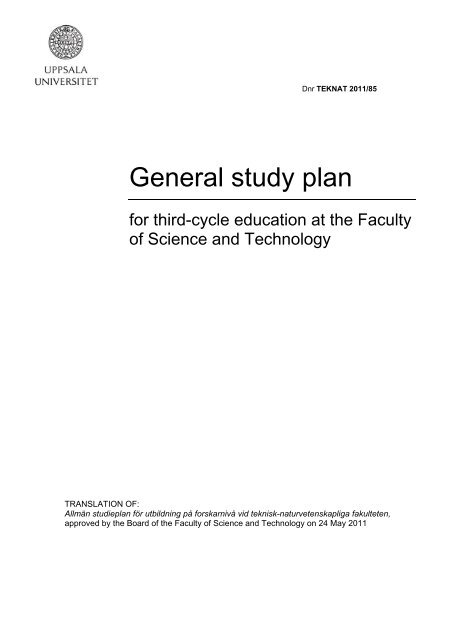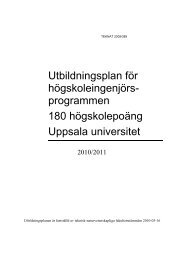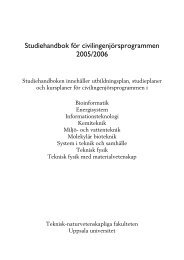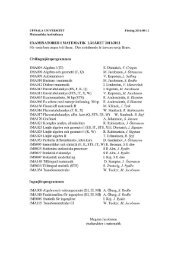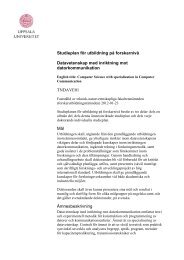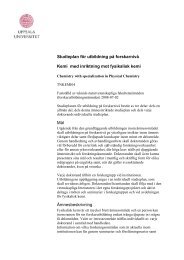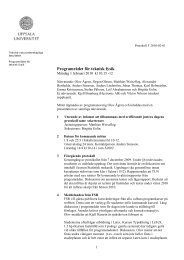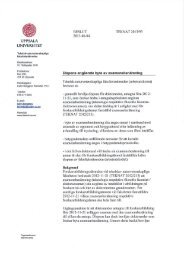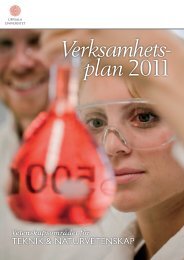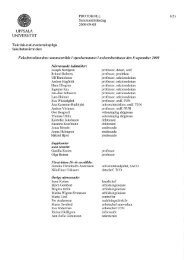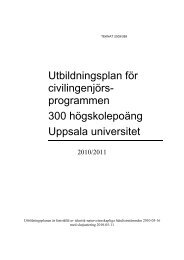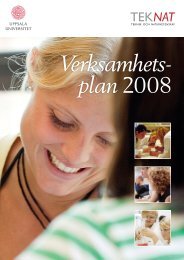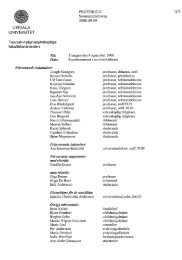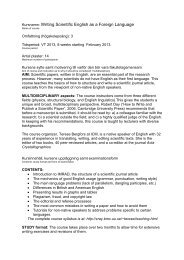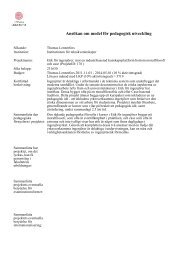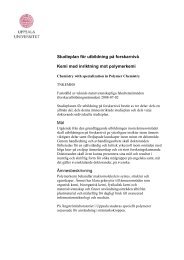General study plan - Teknisk-naturvetenskapliga fakulteten ...
General study plan - Teknisk-naturvetenskapliga fakulteten ...
General study plan - Teknisk-naturvetenskapliga fakulteten ...
You also want an ePaper? Increase the reach of your titles
YUMPU automatically turns print PDFs into web optimized ePapers that Google loves.
Dnr TEKNAT 2011/85<br />
<strong>General</strong> <strong>study</strong> <strong>plan</strong><br />
for third-cycle education at the Faculty<br />
of Science and Technology<br />
TRANSLATION OF:<br />
Allmän studie<strong>plan</strong> för utbildning på forskarnivå vid teknisk-<strong>naturvetenskapliga</strong> <strong>fakulteten</strong>,<br />
approved by the Board of the Faculty of Science and Technology on 24 May 2011
UPPSALA UNIVERSITY<br />
Translation of <strong>General</strong> Study Plan for third-cycle<br />
programmes at the Faculty of Science and Technology<br />
24 May 2011 TEKNAT 2011/85<br />
Contents<br />
Study <strong>plan</strong>s for third-cycle education at the Faculty of Science and Technology _______ 3<br />
<strong>General</strong> _______________________________________________________________ 3<br />
Regulatory framework for third-cycle education ___________________________ 3<br />
Overall goals for third-cycle education __________________________________ 3<br />
Eligibility _________________________________________________________ 5<br />
Basic eligibility _______________________________________________ 5<br />
Special eligibility ______________________________________________ 6<br />
Division of responsibility with regard to third-cycle education_________________ 6<br />
Admissions and selections ___________________________________________ 7<br />
Information and notices ________________________________________ 7<br />
Admissions __________________________________________________ 7<br />
Selections ___________________________________________________ 8<br />
Organisation and follow-up of third-cycle programmes______________________ 8<br />
Individual <strong>study</strong> <strong>plan</strong>s __________________________________________ 8<br />
Allotted time for completion of studies _____________________________ 8<br />
Instruction ___________________________________________________ 9<br />
Courses ____________________________________________________ 9<br />
Miscellaneous_______________________________________________ 10<br />
Training in university/college-level teaching methodology __________________ 10<br />
Supervision______________________________________________________ 10<br />
Financing of studies _______________________________________________ 11<br />
Theses and their defence ___________________________________________ 12<br />
Theses ____________________________________________________ 12<br />
Defence ___________________________________________________ 12<br />
Licentiate seminars___________________________________________ 13<br />
Examiners for courses ________________________________________ 13<br />
Degree titles and degree certificates _____________________________ 14<br />
Right to supervision and other resources _______________________________ 15<br />
Graduation ______________________________________________________ 15<br />
Student Union and student nation membership __________________________ 16<br />
PhD student council _______________________________________________ 16<br />
2
UPPSALA UNIVERSITY<br />
Translation of <strong>General</strong> Study Plan for third-cycle<br />
programmes at the Faculty of Science and Technology<br />
24 May 2011 TEKNAT 2011/85<br />
Study <strong>plan</strong>s for third-cycle education at the Faculty of<br />
Science and Technology<br />
<strong>General</strong><br />
A complete <strong>study</strong> <strong>plan</strong> for third-cycle (licentiate and doctoral) education at the Faculty<br />
of Science and Technology comprises three parts: this general <strong>study</strong> <strong>plan</strong>, any of the<br />
various subject-area/specialisation <strong>study</strong> <strong>plan</strong>s and an individual <strong>study</strong> <strong>plan</strong> specific to<br />
the doctoral student in question. The subject-area/specialisation <strong>study</strong> <strong>plan</strong>s specify the<br />
different programmes’ general content and organisation along with prerequisites and<br />
selection criteria to apply in connection with admission. An individual <strong>study</strong> <strong>plan</strong><br />
comprises a schedule for the doctoral student’s course of studies, a description of the<br />
supervisory structure and a specification of the doctoral student’s and faculty board’s<br />
responsibilities throughout the programme.<br />
Regulatory framework for third-cycle education<br />
Third-cycle education is regulated by the Swedish Higher Education Act (“HL”) 1 and<br />
the Swedish Higher Education Ordinance (“HF”) 2 . These laws are complemented by<br />
more narrowly applicable regulations issued by the University Board 3 , the University’s<br />
vice-chancellor 4 and the Board of the Faculty of Science and Technology, which<br />
regulations are published on the websites of the University (http://www.uu.se/) and<br />
faculty (http://www.teknat.uu.se/).<br />
Overall goals for third-cycle education<br />
Third-cycle education aims to develop such knowledge and proficiency as are required<br />
for the independent pursuit of research (HL). The system of qualifications (HF,<br />
Appendix 2) stipulates the requirements doctoral students must meet to qualify for<br />
doctoral degrees.<br />
Knowledge and understanding<br />
To qualify for a doctoral degree, a doctoral student must demonstrate:<br />
1 The Swedish Higher Education Act (SFS 1992:1434), as amended through 2010.<br />
2 The Swedish Higher Education Ordinance (1993:100), as amended through 2010, to apply in connection with<br />
admission to programmes beginning after June 30, 2007.<br />
3 Antagningsordning och föreskrifter för betyg inom utbildning på forskarnivå vid Uppsala universitet (English:<br />
Admission procedures and degree regulations relating to third-cycle programmes at Uppsala University) (AFUU,<br />
UFV 2010/472)<br />
4 Guidelines for Third-cycle Education at Uppsala University) (UFV 2009/1993)<br />
3
UPPSALA UNIVERSITY<br />
Translation of <strong>General</strong> Study Plan for third-cycle<br />
programmes at the Faculty of Science and Technology<br />
24 May 2011 TEKNAT 2011/85<br />
• Broad knowledge and systematic understanding of a field of research and deep,<br />
current, specialised knowledge relating to a limited area within such field of<br />
research; and<br />
• Intimate familiarity with general scientific/scholarly methodology and the<br />
particular methodology of the relevant field of research.<br />
Competencies and capacities<br />
To qualify for a doctoral degree, a doctoral student must demonstrate:<br />
• Capacities for scientific analysis and synthesis, independent criticism and<br />
evaluation of new and complex phenomena, questions and situations;<br />
• Capacities, marked by a critical standpoint, independence, creativity and<br />
scientific exactitude, for identifying and formulating questions; for the design<br />
and methodologically sound pursuit of research and other advanced activities<br />
within set timeframes; and for the evaluation of such work;<br />
• Via completion of a thesis, an ability to significantly contribute to the advance<br />
of knowledge through independent research;<br />
• An ability to take part in dialogue with the national/international scientific<br />
community and society at large through authoritative verbal and written<br />
presentation and discussion of research and research findings;<br />
• An ability to identify needs for further knowledge; and<br />
• A capacity for contributing to societal development and other individuals’<br />
intellectual progress in research, educational and other advanced professional<br />
contexts.<br />
Evaluative capacity and critical standpoint<br />
To qualify for a doctoral degree, a doctoral student must demonstrate:<br />
• Intellectual independence, scientific integrity and a capacity for research-ethical<br />
judgement; and<br />
• Deep understanding of the possibilities and limitations associated with science,<br />
the role of science within society and human responsibilities in connection with<br />
scientific application.<br />
The following overall goals set by the University Board apply to third-cycle<br />
programmes at Uppsala University (as paraphrased from the relevant parts of “Goals<br />
and Strategies for Uppsala University,” UFV 2007/1478):<br />
• Programmes and submitted theses shall meet high international standards;<br />
4
UPPSALA UNIVERSITY<br />
Translation of <strong>General</strong> Study Plan for third-cycle<br />
programmes at the Faculty of Science and Technology<br />
24 May 2011 TEKNAT 2011/85<br />
• Programmes shall equip doctoral students with scientific/scholarly expertise and<br />
a deep understanding of the subject matter in question;<br />
• Programmes shall provide doctoral students with a grounding in<br />
university/college-level teaching methodology and practice and general<br />
competencies and knowledge that are attractive on the employment market; and<br />
• Programmes shall represent attractive career options.<br />
Strategies for attaining these goals include:<br />
• Encouraging doctoral students to make use of the broad expertise and<br />
educational environments that the University provides;<br />
• Giving notice, nationally and internationally, of programme openings and<br />
admitting doctoral students in accordance with processes characterised by open<br />
competition;<br />
• Providing doctoral students with opportunities to participate in stimulating<br />
exchange of ideas with senior researchers and in the context of conferences,<br />
research programmes, seminars and courses at other universities in Sweden and<br />
abroad;<br />
• Providing new doctoral students with a good introduction to the work<br />
environment and creating secure employment situations;<br />
• Offering teacher-led, doctoral-level courses, good supervision and opportunities<br />
for supervisors to pursue additional education;<br />
• Providing doctoral students with a grounding in research ethics;<br />
• Providing doctoral students with a grounding in university/college-level<br />
teaching methodology and opportunities to teach at the first- and second-cycle<br />
levels; and<br />
• Providing doctoral students with opportunities for developing presentation,<br />
communication, project management, leadership, entrepreneurial and other<br />
relevant skills and for participating in career <strong>plan</strong>ning programmes.<br />
Eligibility<br />
Basic eligibility<br />
Any person who has earned a degree at the second-cycle level and completed<br />
coursework corresponding to at least 240 higher education credits, of which at least 60<br />
shall pertain to the second-cycle level, or otherwise, within the country or abroad,<br />
acquired generally comparable knowledge shall be regarded as possessing basic<br />
eligibility. Institutions of higher education may accept individual applicants from the<br />
requirement with regard to basic eligibility where special considerations apply. Any<br />
person who prior to 1 July 2007 meets the requirement with regard to basic eligibility<br />
for access to education shall thereafter (but until no later than 30 June 2015) be regarded<br />
as possessing basic eligibility for third-cycle education. (HF, Chapter 7 § 39).<br />
5
UPPSALA UNIVERSITY<br />
Translation of <strong>General</strong> Study Plan for third-cycle<br />
programmes at the Faculty of Science and Technology<br />
24 May 2011 TEKNAT 2011/85<br />
Special eligibility<br />
Any requirements established with regard to special eligibility shall be necessary to<br />
ensure that students will be successful in the context of the given programmes. Such<br />
requirements may pertain to knowledge entailed by prior university/college-level and<br />
other corresponding education, special professional experience, necessary language<br />
skills and other matters appropriate to the programmes (HF, Chapter 7 § 40). Special<br />
eligibility requirements are to be specified in subject-area <strong>study</strong> <strong>plan</strong>s.<br />
Division of responsibility with regard to third-cycle education<br />
Ultimate responsibility for the third-cycle education at the University rests with the<br />
University Board and vice-chancellor, who have delegated certain responsibilities to the<br />
various division and faculty boards. (HF, Chapter 2 §§ 2-3).<br />
Although overall responsibility (including responsibility for oversight) rests with the<br />
division and faculty boards, operational responsibility for any given doctoral student<br />
rests with the department at which the student is registered. Division, faculty and<br />
department boards, along with supervisors, bear responsibility for third-cycle<br />
programmes being run in a manner characterised by high quality, efficiency and respect<br />
for the rights and responsibilities of all concerned.<br />
The Board of the Faculty of Science and Technology thus bears overall responsibility<br />
for the faculty’s third-cycle programmes. The faculty determines which subject areas<br />
are to be the focus of such programmes as well as the general content and design of the<br />
<strong>study</strong> <strong>plan</strong>s. The faculty’s third-cycle-programmes board (Forskarutbildningsnämnden<br />
in Swedish) handles ongoing issues and makes decisions (under authorisation by the<br />
faculty board) concerning the establishment of subject-area/specialisation <strong>study</strong> <strong>plan</strong>s,<br />
etc.<br />
The faculty is organised on the basis of sections that cover specific scientific fields:<br />
Mathematics and Computer Science; Physics; Technology; Chemistry; Biology; and<br />
Earth Sciences.<br />
Each section is led by a dean authorised by the faculty board to decide a variety of<br />
matters pertaining to the programmes established within that section.<br />
Education is carried out at the departments. Third-cycle programmes are available in a<br />
large number or subject areas and specialisations. A <strong>study</strong> <strong>plan</strong>, approved by the faculty<br />
board, and a programme head (forskarutbildningsansvarig professor in Swedish) with<br />
overall developmental and quality-control responsibility for the relevant subject<br />
area/specialisation) are in place for each specialisation. Each department has a director<br />
of studies for third-cycle programmes whose duties are specified by the faculty board<br />
and who is authorised by the department head to provide active support, relating to a<br />
range of issues, to the department’s doctoral students, supervisors and programme<br />
heads, regardless of subject area/specialisation (TEKNAT, 24 May 2011).<br />
6
UPPSALA UNIVERSITY<br />
Translation of <strong>General</strong> Study Plan for third-cycle<br />
programmes at the Faculty of Science and Technology<br />
24 May 2011 TEKNAT 2011/85<br />
Admissions and selections<br />
Information and notices<br />
Institutions of higher education shall, through advertisements and other equivalent<br />
means, provide notice with regard to available doctoral studentships 5 , so that any<br />
persons interested in such studentships can apply to such institutions within a certain<br />
time (HF, Chapter 5 § 5). Such notice shall be made locally and on the University’s<br />
website at least three weeks prior to the application deadline (AFUU § 5).<br />
Admissions<br />
Anyone wishing to pursue a doctoral degree should discuss his or her <strong>plan</strong>s with<br />
teachers, researchers and ideally some senior doctoral student to obtain a sense of<br />
programmes at the department in question and prospects within the field.<br />
Applicants to third-cycle programmes should be aware that departments are generally<br />
not able to provide supervision with regard to all specialisations within a subject area<br />
and that new doctoral students are normally admitted for <strong>study</strong> within areas of research<br />
in which departments already have active research teams and established expertise.<br />
Doctoral students with financing in form of doctoral grants or Uppsala-University-based<br />
doctoral studentships are admitted by the various department heads (under authorisation<br />
by the faculty board) in subject areas approved by the faculty board as subject areas for<br />
third-cycle programmes. Any decision with regard to admission of a doctoral student<br />
who is employed in industry, at some other institution of higher education or by a public<br />
authority or who possesses scholarship or his or her own funding will be made by the<br />
faculty board on the basis of recommendations by Forskarutbildningsnämnden. Any<br />
decision with regard to admission of a licentiate student will be made by the faculty<br />
board. Any application for <strong>study</strong> should specify both the subject area and specialisation.<br />
Any decision with regard to admission will be made following consultation with<br />
supervisors within the relevant subject area. Any notice of admission to a third-cycle<br />
programme will include the names of the programme head and the admitted doctoral<br />
student’s supervisors. One of these supervisors will serve as principal supervisor.<br />
Following any decision in favour of admission, the original application and individual<br />
<strong>study</strong> <strong>plan</strong> will be submitted to the faculty office, which will register the doctoral<br />
student in Uppdok.<br />
Admission is made to either a doctoral or licentiate programme. It is important to resist<br />
creation of a two-step model. Accordingly, any admission to a licentiate programme<br />
will be conditioned on some special ex<strong>plan</strong>ation, to be specified in the individual <strong>study</strong><br />
<strong>plan</strong>. The faculty board bears the responsibility, not to be delegated to the department<br />
head, for making any decision regarding admission to a licentiate programme. A student<br />
5 By “available doctoral student employments” is meant doctoral projects that can be applied for.<br />
7
UPPSALA UNIVERSITY<br />
Translation of <strong>General</strong> Study Plan for third-cycle<br />
programmes at the Faculty of Science and Technology<br />
24 May 2011 TEKNAT 2011/85<br />
originally admitted to a licentiate programme may, upon completion of the licentiate<br />
degree and subject to approval of a new application, pursue a doctoral degree.<br />
Selections<br />
The number of doctoral students at a department shall reflect its capacity to meet<br />
acceptable standards with regard to supervision and other programme arrangements and<br />
to offer funding for students in accordance with HF. The faculty board may prescribe<br />
limits to admissions if such standards cannot be met.<br />
Selection processes shall take account of applicants’ prospects for success within the<br />
programmes in question. The relevant institutions of higher education are responsible<br />
for determining what criteria shall apply with regard to assessing such prospects. The<br />
fact that an applicant is considered able to transfer credits for prior courses and <strong>study</strong><br />
programmes, or for professional or vocational experience may not alone give the<br />
applicant priority over other applicants (HF, Chapter 7 § 41).<br />
Organisation and follow-up of third-cycle programmes<br />
Individual <strong>study</strong> <strong>plan</strong>s<br />
In connection with admission of any doctoral student, an individual <strong>study</strong> <strong>plan</strong> shall be<br />
prepared by the doctoral student and his or her supervisor following consultation with<br />
the programme head, or forskarutbildningsansvarig professor. The individual <strong>study</strong><br />
<strong>plan</strong> must be approved by the department head (under authorisation by the faculty<br />
board) prior to admission.<br />
An individual <strong>study</strong> <strong>plan</strong> shall include a supervisor’s statement of the expectations and<br />
specific objectives to apply for the course of studies. The parties should discuss the<br />
supervisory structure and its scope. The focus of research should be well delineated, and<br />
ambitions should reflect quality requirements and the allotted time of four years for<br />
completion of the programme.<br />
Individual <strong>study</strong> <strong>plan</strong>s shall be subject to annual review by doctoral students and their<br />
supervisors and supplemented with summaries of accomplished objectives and<br />
expectations for the coming year. Doctoral students’ performance should be assessed<br />
individually in connection with such annual reviews. Some independent third party (i.e.,<br />
someone other than a supervisor, such as the department’s director of studies for thirdcycle<br />
programmes) shall participate in any such performance assessment. Significant<br />
changes or lack of agreement with regard to a <strong>study</strong> <strong>plan</strong> shall immediately be reported<br />
to the department head or, if such is deemed necessary, to Forskarutbildningsnämnden.<br />
In any case involving significant deviation, the department head shall request the<br />
doctoral student and supervisor to submit written statements.<br />
Allotted time for completion of studies<br />
Holders of doctoral studentships are expected to take their studies seriously. Doctoral<br />
students may indeed to a limited extent engage in teaching, research and administration,<br />
8
UPPSALA UNIVERSITY<br />
Translation of <strong>General</strong> Study Plan for third-cycle<br />
programmes at the Faculty of Science and Technology<br />
24 May 2011 TEKNAT 2011/85<br />
provided, however, that such engagement may not, prior to completion of their doctoral<br />
degrees, account for more that 20 per cent of their full-time hours of employment (HF,<br />
Chapter 5 § 2).<br />
Programmes shall comprise coursework as well as research projects culminating in<br />
theses. Study of literature and active participation in seminars is also implied. Holders<br />
of doctoral studentships may participate in teaching or administrative work at their<br />
departments accounting for up to 20 per cent of their full-time schedules, in which case<br />
the periods of their studentships will be correspondingly extended. Although teaching at<br />
the first-cycle level and other department responsibilities provide valuable experience,<br />
studies may suffer if such work requires too much commitment relative to the rest of a<br />
student’s undertakings.<br />
The period for which a doctoral student holds a doctoral studentship may not exceed<br />
what corresponds to a full-time, four-year, third-cycle programme (HF, Chapter 5 § 7).<br />
Institutions of higher learning shall assess whether prior education or other activity can<br />
be counted for credit (HF, Chapter 6 § 8). Courses that serve to establish special<br />
eligibility are excluded in this regard.<br />
The greater part of coursework should be completed within the first half of the time<br />
allotted for completion of a programme. Students are expected to participate actively in<br />
department seminars and should also take advantage of useful course offerings at other<br />
departments and universities.<br />
Instruction<br />
Instruction in the context of a programme can take the form of tutoring, lectures,<br />
seminars, field courses or laboratory courses.<br />
Education is provided to the extent that available resources permit. Doctoral students<br />
are expected to acquaint themselves with portions of the course literature on their own;<br />
training in independent <strong>study</strong> represents an important dimension of third-cycle<br />
education.<br />
Doctoral students are expected to actively take part in seminars, be present at guest<br />
lectures and otherwise be involved in scientific activities at their departments.<br />
Courses<br />
Courses and studies of literature provide broad insights into a field, complementing the<br />
specialised expertise gleaned from research activity. The coursework portion of a thirdcycle<br />
programme aiming at a doctoral degree shall encompass 40–120 higher education<br />
credits. The coursework portion of a programme aiming at a licentiate degree shall<br />
encompass 20–60 higher education credits. Such coursework shall include courses in<br />
research ethics and, for doctoral students who teach at the first- or second-cycle levels,<br />
university/college-level teaching methodology. An introduction to <strong>study</strong> at the thirdcycle<br />
level and a course in scientific writing are recommended. Doctoral students with<br />
first languages other than Swedish can receive credit for courses in the Swedish<br />
9
UPPSALA UNIVERSITY<br />
Translation of <strong>General</strong> Study Plan for third-cycle<br />
programmes at the Faculty of Science and Technology<br />
24 May 2011 TEKNAT 2011/85<br />
language. The courses comprised by a given doctoral student’s course of <strong>study</strong> are<br />
specified in his or her individual <strong>study</strong> <strong>plan</strong>.<br />
Course examinations may be written or oral and are arranged by agreement between the<br />
individual doctoral student and his or her principal supervisor or some other teacher<br />
authorised to decide grades. Two grades, “pass” and “fail,” apply. Course examinations<br />
are accordingly handled by appointed teachers (see below).<br />
Miscellaneous<br />
The faculty’s language policy provides that all persons at the University are to be given<br />
the opportunity to access information and participate in decisions that concern their own<br />
activities. Courses in Swedish and how to teach in Swedish are to be regularly offered<br />
to all teaching personnel, including doctoral students, who have first languages other<br />
than Swedish. The faculty has charged the departments with encouraging doctoral<br />
students to participate in such courses (see the Language Policy (2010-2013) action<br />
<strong>plan</strong>).<br />
A doctoral student and his or her supervisors shall keep one another continuously<br />
informed as to the progress of research and about any <strong>plan</strong>ned travel, periods of<br />
intensive teaching or other matters of significance for the student’s studies. A doctoral<br />
student shall provide timely information about equipment, travel allowance and other<br />
similar needs to allow supervisors to assist with the acquisition of funding.<br />
In connection with experimental studies requiring complicated apparatus, it can be<br />
advantageous for several doctoral students to have similar research specialisations to<br />
allow joint activities to be organised around the same apparatus. It may be appropriate<br />
for doctoral students with similar projects to collaborate with regard to field studies.<br />
Training in university/college-level teaching methodology<br />
Training in teaching methodology is mandatory for any doctoral student <strong>plan</strong>ning to<br />
teach. Such training shall either involve some element of the individual <strong>study</strong> <strong>plan</strong> for<br />
which the student receives credit or be carried out within the framework of his or her<br />
departmental duties (see Guidelines for Third-cycle Education at Uppsala University, §<br />
5).<br />
Supervision<br />
For each doctoral student, the faculty board shall, via delegation to the relevant<br />
department head, appoint at least two supervisors, including a principal supervisor<br />
responsible for the student’s course of <strong>study</strong> and dissertation work and an assistant<br />
supervisor. The principal supervisor shall have undergone at least two days of<br />
supervisor training or be deemed to possess equivalent competence. (TEKNAT, 12<br />
October 2010). One of the supervisors shall be employed by or serve in the capacity of<br />
adjunct to Uppsala University or the Swedish Institute of Space Physics. At least one of<br />
the supervisors shall have attained at least the status of reader (or “docent”) (AFUU §1).<br />
10
UPPSALA UNIVERSITY<br />
Translation of <strong>General</strong> Study Plan for third-cycle<br />
programmes at the Faculty of Science and Technology<br />
24 May 2011 TEKNAT 2011/85<br />
It is the responsibility of each department head to ensure that there is sufficient time for<br />
supervision of the department’s doctoral students. Any problem that arises in this regard<br />
should be identified by the doctoral student in question at the time of annual review of<br />
his or her individual <strong>study</strong> <strong>plan</strong>. It should be borne in mind that doctoral students are<br />
just entering the world of research and are naturally subject to insecurity and doubt. It is<br />
accordingly incumbent on supervisors to provide doctoral students with support and<br />
encouragement alongside constructive criticism. Doctoral students should at all times be<br />
made to know and feel that their studies are of positive interest to their supervisors. A<br />
supervisor must be attentive so that he or she is able to take timely action in the event<br />
that a doctoral student begins to lose courage or for some other reason falls behind<br />
schedule.<br />
The fact that a doctoral student has been assigned a given supervisor must not constitute<br />
a hindrance to contact being taken with other qualified persons within the relevant field<br />
of research. Such resource persons (within or without the faculty) may be involved,<br />
without formal responsibilities, in different parts of a student’s course of <strong>study</strong>. It is also<br />
important that a department’s doctoral students have contact among themselves and that<br />
more experienced doctoral students help newer ones to find their way.<br />
Doctoral students often need strong guidance at the time of their introduction to<br />
research, after which they will progressively come to work more independently. Close<br />
contact is imperative, and supervisors must always be prepared to discuss results<br />
attained and any suggestions made by doctoral students. Supervision involves give and<br />
take, such that doctoral students ought not to expect (or be satisfied with) unilateral<br />
giving on the part of their supervisors. Although work in groups is generally<br />
stimulating, supervisors and doctoral students must at times agree to boundaries<br />
between different roles, so that individual efforts can be properly evaluated at<br />
examination time.<br />
Even if supervisors have the more important role, doctoral students must also take<br />
responsibility for ensuring that communication is effective. Contact with other<br />
researchers and doctoral students at a department is very important to individual<br />
doctoral students’ development. More experienced doctoral students in a research group<br />
represent a valuable source of support for newcomers. It goes without saying that in the<br />
context of laboratory work the technical staff is of great importance for the educational<br />
process.<br />
Doctoral students shall be entitled to change supervisors upon request (HF, Chapter 6 §<br />
28).<br />
Financing of studies<br />
Funding for studies at the third-cycle level is regulated by, among other statutes, HF,<br />
Chapter 7 §§ 34 and 36. Doctoral students can count on funding corresponding to four<br />
years of full-time <strong>study</strong>. Uppsala University strives in the first instance to provide<br />
funding in the form of doctoral studentships Doctoral grants may be held for at most 12<br />
11
UPPSALA UNIVERSITY<br />
Translation of <strong>General</strong> Study Plan for third-cycle<br />
programmes at the Faculty of Science and Technology<br />
24 May 2011 TEKNAT 2011/85<br />
months of actual <strong>study</strong>. Only restricted use of scholarship and other forms of<br />
independent funding is to be made. A scholarship shall be employed only where a donor<br />
or other external provider of funding makes explicit provision for this. Where some<br />
form of funding other than a doctoral studentship or a doctoral grant serves to finance a<br />
doctoral project, a written report of the applicable special considerations shall be<br />
attached to the documentation submitted to the faculty office prior to the decision with<br />
regard to admission.<br />
Doctoral students are entitled to compensation for thesis printing costs.<br />
Theses and their defence<br />
Theses<br />
Research projects shall culminate in scientific theses to be defended publicly. A<br />
research project may be carried out independently or in collaboration with other persons<br />
within or without a department. The doctoral student shall in either event be trained to<br />
pursue research independently.<br />
Doctoral theses (in whole or summary form) shall either meet such requirements as<br />
apply for publication in international scientific journals of high quality or be summaries<br />
of shorter scientific writings meeting equivalent quality requirements. A thesis may thus<br />
either take the form of a monograph, i.e., a unified scientific work, or a combination<br />
thesis, i.e., a series of scientific writings along with a brief summary. The latter form is<br />
most common at the Faculty of Science and Technology. A thesis written by a doctoral<br />
student in collaboration with another person will be considered only to the extent that<br />
the student’s individual contributions can be identified.<br />
A significant portion of any thesis should normally be published in journals meeting<br />
high international standards. Doctoral students and their supervisors should devote<br />
substantial time to the expositional aspect of writings, since significant results may be<br />
poorly received if presented in clumsy language.<br />
A thesis shall include a two-to-five-page summary in Swedish.<br />
Although licentiate theses are shorter than doctoral theses, the same quality<br />
requirements apply with regard to the included writings.<br />
Defence<br />
Doctoral theses are to be orally and publicly defended.<br />
It is incumbent on a doctoral student’s principal supervisor to judge, in consultation<br />
with assistant supervisors and the programme head, when the thesis project has<br />
progressed to the point that the defence should be scheduled and to propose a faculty<br />
examiner and examining committee.<br />
12
UPPSALA UNIVERSITY<br />
Translation of <strong>General</strong> Study Plan for third-cycle<br />
programmes at the Faculty of Science and Technology<br />
24 May 2011 TEKNAT 2011/85<br />
Nobody who has served as a supervisor to a given doctoral student may sit on the<br />
relevant examining committee. Supervisors and the faculty examiner are entitled to be<br />
present at the beginning of the meeting of the examining committee, but only committee<br />
members may be present at the time of final deliberation and decision. (TEKNAT, 23<br />
November 2010)<br />
The forms to apply in connection with the defence and examination of doctoral theses<br />
are governed by HF and University regulations for third-cycle programmes. The<br />
examining committee members shall serve as the thesis examiners. Thorough<br />
instructions with regard to the forms applying in connection with the defence of theses<br />
are available in English on the faculty website.<br />
Thesis defences are held during regular school terms and during summer breaks,<br />
excepting the periods from 15 June to 15 August. Any notice of the time and place for a<br />
thesis defence shall be made at least three weeks in advance. Likewise, the thesis shall<br />
be available at least three weeks in advance.<br />
Licentiate seminars<br />
It is incumbent on a licentiate student’s principal supervisor to judge when the thesis<br />
project has progressed to the point that the licentiate seminar should be scheduled and,<br />
following consultation with the programme head, to appoint reviewers for the licentiate<br />
thesis.<br />
A licentiate thesis shall be presented at a seminar arranged during a regular school term<br />
or summer break, excepting any period from 15 June to 15 August, and shall be made<br />
available at the department office at least three regular-term weeks in advance.<br />
Notice with regard to any thesis presentation (author, title, subject area, availability,<br />
time and place of seminar) shall be sent at least three weeks in advance to the<br />
departments within the section and any departments at other institutions in Sweden<br />
whose focus encompasses the subject matter. Such notice shall also be made via the<br />
University’s weekly programme.<br />
A thesis presentation shall begin with a lecture by the author. Thereafter, a specially<br />
prepared reviewer – generally the holder of a doctorate from some other research<br />
programme – will deliver a brief critical review.<br />
The grade accorded a licentiate thesis – “pass” or “fail” – is determined by the<br />
programme head (or some other professor with whom the programme head charges this<br />
responsibility) in consultation with the principal supervisor and the reviewer.<br />
Examiners for courses<br />
According to HF, grades for tests in connection with third-cycle programmes shall be<br />
determined by examiners, who shall be teachers specially appointed by the institutions<br />
of higher learning in question. The Board of the Faculty of Science and Technology has<br />
established the following guidelines for appointment of examiners.<br />
13
UPPSALA UNIVERSITY<br />
Translation of <strong>General</strong> Study Plan for third-cycle<br />
programmes at the Faculty of Science and Technology<br />
24 May 2011 TEKNAT 2011/85<br />
With regard to that part of coursework, intrinsic to a programme, that a doctoral student<br />
covers through independent <strong>study</strong> of literature or other independent activity, the<br />
principal supervisor shall serve as examiner; consultation with assistant supervisors is<br />
presumed.<br />
An examiner’s sole responsibility is to decide the grade in connection with a test.<br />
Determination as to which courses shall count for credit in the context of a doctoral<br />
student’s programme and with what numbers of credits is the responsibility of the<br />
principal supervisor, in consultation with the department head and other supervisors and<br />
with consideration taken of the relevant subject-area <strong>study</strong> <strong>plan</strong>.<br />
Degree titles and degree certificates<br />
The title of the degree being pursued by a given student will be stated in the certificate<br />
of admission and the individual <strong>study</strong> <strong>plan</strong>. The degree certificate will normally state<br />
both the subject area and specialisation. The specialisation can be omitted from the<br />
degree certificate if the doctoral student so requests.<br />
Any application with regard to change of subject area (with or without a specification of<br />
the specialisation) shall be submitted in good time prior to the thesis defence and in any<br />
event prior to the appointment of the faculty examiner and examining committee or<br />
submission of the thesis for printing, whichever of these occurs first.<br />
The faculty board has charged the department heads with making any decisions with<br />
regard to change of subject area. Doctoral students apply for such changes by filling in a<br />
new application for admittance to a third-cycle programme.<br />
The Swedish title of any degree awarded upon completion of a doctoral programme at<br />
the Faculty of Science and Technology will be either filosofie doktor or teknologie<br />
doktor. The latter will apply in connection with persons admitted to programmes on the<br />
basis of civil engineering degrees. The English rendering will in either case be doctor of<br />
philosophy.<br />
Subject to special application for exemption, filosofie doktor degrees may be earned by<br />
persons who are accepted to doctoral programmes on the basis of civil engineering<br />
degrees but whose doctoral degrees pertain to non-engineering subject areas. Similarly<br />
subject to application for exemption, teknologie doktor degrees can be earned by<br />
persons admitted to doctoral programmes on the basis of Master of Science or other<br />
similar degrees. Such exemptions will be granted by the faculty board, in no case later<br />
than the time of appointment of the faculty examiner and examining committee.<br />
Licentiate degrees, likewise, may have either of two Swedish titles, filosofie licentiat or<br />
teknologie licentiat, both of which are rendered in English as licentiate of philosophy.<br />
Doctoral degree certificates are issued following application to the Graduation Office at<br />
the Student Affairs and Academic Registry Division.<br />
14
UPPSALA UNIVERSITY<br />
Translation of <strong>General</strong> Study Plan for third-cycle<br />
programmes at the Faculty of Science and Technology<br />
24 May 2011 TEKNAT 2011/85<br />
Right to supervision and other resources<br />
Should a doctoral student significantly neglect his or her obligations in accordance with<br />
his or her individual <strong>study</strong> <strong>plan</strong>, the vice-chancellor shall deem such doctoral student to<br />
no longer be entitled to supervision and other programme resources. Before any such<br />
decision is made, the doctoral student and his or her supervisors shall be provided an<br />
opportunity to submit statements. The matter shall be decided on the basis of their<br />
statements and such other documentation as is available to the faculty board.<br />
Consideration shall be given to whether the faculty board has fulfilled its obligations in<br />
accordance with the individual <strong>study</strong> <strong>plan</strong>. Any decision shall be made in writing and<br />
include an ex<strong>plan</strong>ation. Resources may not be withdrawn for any period in which the<br />
doctoral student is holds a doctoral studentship or is receiving a doctoral grant (HF,<br />
Chapter 6 § 30).<br />
If programme resources are withdrawn as provided above, the doctoral student may<br />
reclaim his or her right to supervision and other resources following application to the<br />
vice-chancellor. The doctoral student must in such event provide evidence that future<br />
results of significant quality and scope will be forthcoming or otherwise make a<br />
plausible case that he or she will be able to fulfil his or her remaining obligations in<br />
accordance with the individual <strong>study</strong> <strong>plan</strong>.<br />
In the rare event that a supervisor or doctoral student judges there to be some<br />
circumstance that will make it difficult to complete a programme on schedule, the<br />
department head (or other individual charged by the department head with responsibility<br />
for the matter) shall pursue a discussion with the parties regarding the continuation of<br />
work. In cases where the problems cannot be solved through the involvement of the<br />
department head, one or more of the parties may turn to the chairperson of<br />
Forskarutbildningsnämnden to discuss the situation. The PhD student council and<br />
Student Union’s ombudsman for doctoral students may also be able to provide support.<br />
In any case involving unsatisfactory grades, a variety of measures, such as switching<br />
projects or supervisors or appointment of an additional supervisor, may be considered.<br />
Such problems shall not be allowed to persist over long periods of time without<br />
measures being taken. The department head should not hesitate to advise a doctoral<br />
student to quit a programme if insurmountable problems exist.<br />
Graduation<br />
Graduation is a formal occasion arranged by the faculties at Uppsala University at the<br />
end of the January and May terms. Jubilee doctors, who graduated 50 years previously,<br />
are honoured at May graduation ceremonies. At January graduation ceremonies,<br />
honorary doctors (Latin: doktor honoris causa) are welcomed into the University’s<br />
research community. For doctors who have just completed their degrees, graduation<br />
represents a festive conclusion to their studies.<br />
15
UPPSALA UNIVERSITY<br />
Translation of <strong>General</strong> Study Plan for third-cycle<br />
programmes at the Faculty of Science and Technology<br />
24 May 2011 TEKNAT 2011/85<br />
Formal acceptance of a doctoral degree and participation in a graduation ceremony are<br />
voluntary. Degrees may be formally accepted up to five years following defence of a<br />
thesis.<br />
The diploma issued at graduation is no substitute for the aforementioned degree<br />
certificate, which is issued upon request and which is the official document containing<br />
information about the completed doctoral degree.<br />
Student Union and student nation membership<br />
Membership in the Uppsala Student Union and any of the student nations is voluntary<br />
for doctoral students. Access to the student nations requires membership in a student<br />
nation.<br />
PhD student council<br />
Doctoral students at the Faculty of Science and Technology are organised in a PhD<br />
student council. This body appoints doctoral student representatives to the faculty board<br />
and other boards and similar bodies at the faculty level and looks after the interests of<br />
doctoral students at the faculty. The PhD student councils of the various faculties have<br />
representatives in the Uppsala Student Union’s PhD student council, which handles<br />
issues of concern to doctoral students throughout the University. An ombudsman for<br />
doctoral students, who is required to observe confidentiality and specially entrusted to<br />
assist with personal matters of relevance to doctoral students, is available at the Student<br />
Union.<br />
16


